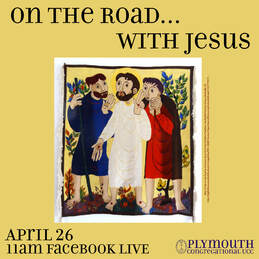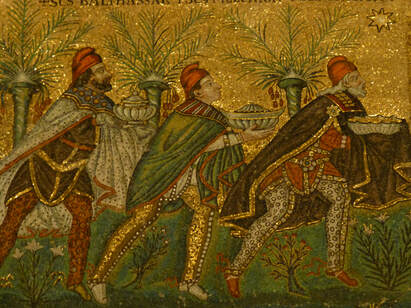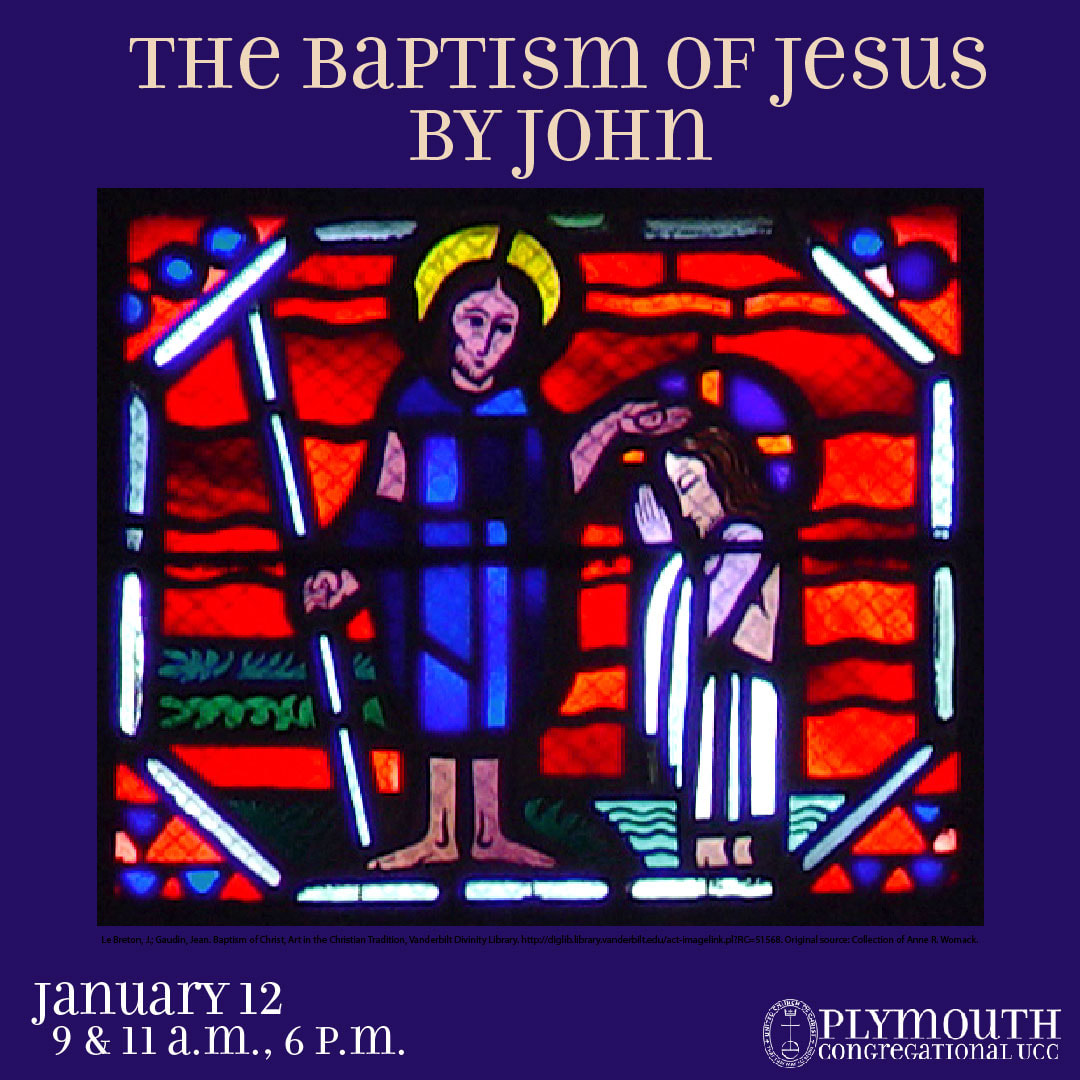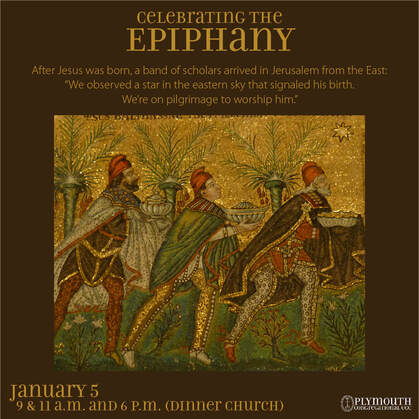
Luke 24.13-34*
3rd Sunday after Easter Plymouth Congregational Church, UCC The Rev. Jane Anne Ferguson They were simply walking down the road, these disciples, and Jesus came and walked with them. They were in that numbing, aching stage of grief, where you say to yourself, ”This is really happening to me, to us? This can’t be happening. This IS really happening. To us.” In their grief Jesus came and walked with them. They were just going home to start life over again after their hopes for new life had been destroyed and Jesus came and walked with them. They were ordinary folk, not in the inner circle of disciples that we have hear named throughout all four of the canonical gospels, and Jesus came and walked with them. Though they did not recognize him, he walked with them, talked with them, listening to their grief and fear. In unrecognized, yet extraordinary, circumstances, Jesus came and walked and talked these two regular people all the way home. And then came in to stay with them. There are lines of poetry that have stuck with my soul since a Modern Poetry class my Senior year in college. “I wake to sleep and take my waking slow, I feel my fate in what I cannot fear, I learn by going where I have to go.” ["The Waking” by Theodore Roethke can be found at poetryfoundation.com.] From Theodore Roethke’s enigmatic poem. “The Waking,” I have heard the echoes of those words over and over in the experiences of my life. “I learn by going where I have to go.” I have made plans and carried many of them through, choosing schools and jobs and life partners. Yet the plans always take unexpected turns or dissolve in to new plans along the way. Life always seem to give us unexpected routes on the “planned” journey. Change happens. We learn by going where we have to go. It is an oft repeated metaphor that life is a journey. I would go further to say that life walking with Jesus is a pilgrimage. And the only way to walk it is to learn by going where you have go. We like to define pilgrimage as an intentional sacred journey toward the Holy. When Hal and I have led pilgrimages, we make very specific plans. Yet it is usually the unplanned moments that make meaning of the journey. You cannot plan the sacred, the inbreaking of the Holy. You can only make room, make space, for it. If we think of life with Jesus as a pilgrimage, why doesn’t it feel more sacred in that elevated, “stained glass window, unseen choir singing ‘Ahhhh!’” sense of the word? Life more often just feels messy because life is messy! My friends, in case you haven’t noticed, the messy is sacred, because the Holy One holds all of Life. Learning to live in relationships, as a child, as a teen, as an adult of any age, is messy and its sacred. Getting through school at any age feels messy and its sacred. Parenting is messy and its sacred. Choosing a job, advancing a career, as we wrestle with purpose and meaning in life is messy and its sacred. Loving those who love us and those who don’t is messy and its sacred, holy. Life as a pilgrimage is most like those sacred journeys when the pilgrim sets out simply to follow the Holy Spirit, wherever it might take her. There is not necessarily a specific sacred site for praying as the destination or some sacred mission to fulfill. And if there is, well, plans change and life gets messy. We learn by going where we have to go. This is the journey the disciples in our gospel story find themselves walking. Plans have changed in a big way. Nothing has turned out as they expected when they headed for Jerusalem to have Passover with Jesus a few days ago. Everything is turned upside down and now what? Their beloved rabbi is dead. This was not in the plans! He was going to be the one to redeem Israel….to make it whole again…to liberate them from the Romans. He was the Messiah! At least that’s what they had thought. Then he was betrayed by the very people who you would think would be following him. He was handed over to be executed as a criminal. Now he’s dead! Isn’t he? What about what those women said they saw? What else to do but head home? Life does not feel safe. As followers of this one who had been executed as a criminal, were they now suspect? Were their lives in danger? And what about their hopes and dreams? They are dashed. I feel the ache in their hearts, the tiredness in their bones, the confusion in their minds, the fear that seizes their gut. On top of it all they long for their leader, they miss their friend, Jesus. Will the community they had grown together on the pilgrim journey following Jesus through the countryside be completely gone now? How can they go back to their lives before? Nothing feels normal. Will it ever again? And in the midst of all these questions, in the midst of their suffering, on this pilgrim journey home, the Risen Jesus comes unbidden and walks with them. ~~~~~~~~~~~~~~~~~~~~~~~~~~~ We had lots of plans for this spring! Trips to take. Sports to play and sports teams to support. Classes to complete. Graduation ceremonies to celebrate and attend. Camps for summertime. New jobs perhaps. Then Covid 19 happened. Now people are dying. People are losing jobs. The economy is uncertain to say the least. School is radically changed as teachers and children scramble to connect on line. Here I am preaching and worshiping with you over Facebook! Our life is full of questions! Is there a destination we are headed towards or is it all just messy? Do we want “normal” back? What do we want in a new “normal?” Which leaders do we trust, do we follow into this new unknown world? Nothing feels very safe anymore. Now what? Is it all dead? The two disciples had heard rumors of women who had gone to Jesus’ tomb and seen angels and heard that he was not dead. He is alive! We have been through Holy Week and heard the stories of Easter. We know that death is the not the final answer for us as Easter people who follow Jesus the Christ. We know that with our heads…but our hearts are still scared and worried and uncertain. We are walking a road that is unknown. Our plans are all up in the air. It’s very messy! Like our disciples we have been plunged into pilgrimage whether we like it or not! We could sit down and wait till all was clear on the path. But we would never get home that way. Instead, we must learn by going where we have to go. My friends, the simple truth of this gospel story is that just like the disciples discovered, Jesus, the Risen Christ, is walking along with us on our pilgrim journey. Even when we think we are alone, we are not alone. Christ walks beside us. Will we recognize the presence of the Holy that is always with us in the mess of life’s journey? We wrestle with the frustrations, sorrows, fears of this pandemic journey. We debate the hows and whens of re-opening our communities. In the midst of it all, Jesus, walks along with us listening, teaching, simply being on the journey when we least expect it. Remember when God’s peace breaks finally through for the two disciples? It’s when their hearts are open as they sit down to share a meal, probably all they have in the house, as they have been gone several days. May we remember to open our hearts to invite the presence of the Risen Christ into the homes of our souls, as well as our literal homes. May we invite the Christ to sit down at the inner tables of our hearts and souls, as well as the our outer kitchen and dining tables to break bread, to share sustenance. As we relinquish control of our resources, share the source of what feeds us, into the hands of the Holy One, suddenly all is clear. We will see. We will know the Presence and find peace. We are walking down life’s road in this very messy crisis time in our world. The Risen Christ, the Spirit of Life Anew, is with us. God holds us even when we are not watching. Walks with us even when we cannot see or feel the holy Presence. Accompanies us on the pilgrim journey. As we turn inward in prayer, in contemplation, in simple Being with our selves, with our loved ones in the now of each moment, leaving behind the “what ifs,” the worry and fear of plans tentatively made….as we offer up all that we have in thanksgiving and to a be blessing, we will glimpse the Holy One and it will be enough! It will infuse our souls with the energy of sacred Joy so that we can continue as pilgrims traveling the unknown roads of our times. Jesus is walking and talking us home. Entering our hearts in new ways. We will learn by going where we have to go. Amen. ©The Reverend Jane Anne Ferguson, 2020 and beyond. All rights reserved.
*Luke 24.13-34
13 Now on that same day two of them were going to a village called Emmaus, about seven miles from Jerusalem, 14 and talking with each other about all these things that had happened. 15 While they were talking and discussing, Jesus himself came near and went with them, 16 but their eyes were kept from recognizing him. 17 And he said to them, "What are you discussing with each other while you walk along?" They stood still, looking sad. 18 Then one of them, whose name was Cleopas, answered him, "Are you the only stranger in Jerusalem who does not know the things that have taken place there in these days?" 19 He asked them, "What things?" They replied, "The things about Jesus of Nazareth, who was a prophet mighty in deed and word before God and all the people, 20 and how our chief priests and leaders handed him over to be condemned to death and crucified him. 21 But we had hoped that he was the one to redeem Israel. Yes, and besides all this, it is now the third day since these things took place. 22 Moreover, some women of our group astounded us. They were at the tomb early this morning, 23 and when they did not find his body there, they came back and told us that they had indeed seen a vision of angels who said that he was alive. 24 Some of those who were with us went to the tomb and found it just as the women had said; but they did not see him." 25 Then he said to them, "Oh, how foolish you are, and how slow of heart to believe all that the prophets have declared! 26 Was it not necessary that the Messiah should suffer these things and then enter into his glory?" 27 Then beginning with Moses and all the prophets, he interpreted to them the things about himself in all the scriptures. 28 As they came near the village to which they were going, he walked ahead as if he were going on. 29 But they urged him strongly, saying, "Stay with us, because it is almost evening and the day is now nearly over." So he went in to stay with them. 30 When he was at the table with them, he took bread, blessed and broke it, and gave it to them. 31 Then their eyes were opened, and they recognized him; and he vanished from their sight. 32 They said to each other, "Were not our hearts burning within us while he was talking to us on the road, while he was opening the scriptures to us?" 33 That same hour they got up and returned to Jerusalem; and they found the eleven and their companions gathered together. 34 They were saying, "The Lord has risen indeed, and he has appeared to Simon!" 35 Then they told what had happened on the road, and how he had been made known to them in the breaking of the bread. AuthorAssociate Minister Jane Anne Ferguson is a writer, storyteller, and contributor to Feasting on the Word, a popular biblical commentary. Learn more about Jane Anne here.
0 Comments
Hal preaches on Matthew 3:13-17 to start the new year, the 400th anniversary of the Mayflower Pilgrims landing on Plymouth Rock in 1620.
AuthorThe Rev. Hal Chorpenning has been Plymouth's senior minister since 2002. Before that, he was associate conference minister with the Connecticut Conference of the UCC. A grant from the Lilly Endowment enabled him to study Celtic Christianity in the UK and Ireland. Prior to ordained ministry, Hal had a business in corporate communications. Read more about Hal.
Matthew 2.1-12 The Rev. Hal Chorpenning, Plymouth Congregational UCC Fort Collins, Colorado 
What did you expect to find the first day you walked into Plymouth? (I know that a few of you were carried into the church in your parent’s arms, but for the vast majority of adults, we made a decision to come here.) Were you expecting to find a church just like the one you grew up in? Or maybe you weren’t raised in any particular religious tradition and thought it might be like a church service you’d seen televised. Perhaps you were expecting a praise band and projected PowerPoint during the sermon. What did you expect to find?
What were you seeking when you came? Sometimes people come to church in the midst of a personal crisis, after a divorce or as part of their sobriety or as a response to illness. Maybe for you, it was an effort not to be alone, to find community, to find a way to educate your children about spirituality in a progressive context. Maybe you had a not-so-positive experience in another church and were giving Christianity one last try. For me finding a church was something of a pilgrimage. I remember when I was in my 20s and living in Santa Barbara, I felt the need to find a harbor where I could safely ask the questions that still floated around like flotsam from my childhood faith. I needed a more adult faith. A college friend and I did the rounds of churches together: we went to All Saints Episcopal, which has now grown into a wonderful congregation, but was then pretty staid. I then tried First Congregational UCC, and I was far and away the youngest person in the church. (I had just returned from graduate school in London, and the elderly man sitting next to me chatted about the last time he was in London…after the war…in 1918.) And finally at the invitation of one of my colleagues at the university, we found our way to the Unitarian Society of Santa Barbara, which looked like a Spanish mission church, had a great pipe organ, a choir that robed and processed, and a minister who had been a United Methodist clergyman. And they welcomed my spiritual quest. That was what I was seeking in my 20s, having rejected the Protestantism of my youth and the Buddhism I tried to practice in college. (I was what one Buddhist abbot calls a “Barnes and Noble Buddhist:” one who reads books and practices without the benefit of a sangha or community.) And the Unitarians were a great home for me for a while. I loved the liberality of their approach…but for me there was always something missing. (And I don’t mean this as a slam against our Unitarian cousins in any way.) I wasn’t able to identify the absence at that point. It was as if, just at the time I had arrived in a crowded room, someone else had just walked out …and somehow the dynamic changed…the person who was the life of the party wasn’t there. A few years later when we moved to Boulder, my former wife and I didn’t find a good fit with the Unitarians, and so I convinced her to try First Congregational UCC. Here is what I expected: plenty of men dressed in suits and women in dresses, an order of worship unchanged from my New England Congregational roots, and a sense of propriety and decorum. And their building – a big turn of the century stone edifice – contributed to that sense that this would be a church of the establishment, not the movement. What I found instead was a vital, engaged, non-artificial Christian community that really celebrated the sacraments, and I discovered that one of the missing elements for me had been communion: sharing the living presence of Christ through the elements that represent his body and lifeblood. And in the midst of the freshness of their approach, the church maintained enough tradition in the service to keep us connected with our roots. Things are not always what they seem. And our expectations are not always so closely in line with what we hoped or feared. So, I invite you to take a moment and consider what you were seeking when you first came to Plymouth and what you expected to find. … Were there pleasant surprises? disappointments? differences? What are the elements you found here that keep you here? Are there friends you couldn’t bear to leave? Is there a point of access to the sacred, to God, in your experience here at Plymouth? Is there a sense that this is a place where people are still trying doggedly, faithfully to help change the world and bring in the kingdom of God here and now and still unfolding? Our souls yearn for something…what does yours cry out for?
These miraculous, trouble-filled, joyous, frustrating, fascinating, struggling journeys that we call our lives are best when we listen deeply — beyond the blare of the television or the constant diversion of our cell phones. If we don’t take time to look at the wonders of light within our lives and the light that shines from the lives of others, we will miss it…miss the meaning and the depth of life, in all the pain and the joy of it.
We will miss the light of the Spirit. Do you imagine that there was some hunger, some deep driving force that led three ancient astrologers across the desert sands and into a foreign country? Was their pilgrimage meant to satisfy their intellectual curiosity? What political reality did they hope to uncover? After all, they came to pay homage to a new king. What passion drove them into the court of Rome’s puppet king, Herod, and then to the manger in the animal stalls where an unwed mother laid her baby? One of the things that motivated the magi is probably something that drew you to this place. No, you didn’t have to cross a desert to get here and your trip to church was not likely as arduous…but yours in a pilgrimage nonetheless. Perhaps these journeyers, these unlikely heroes, these gift-bearing foreigners are a model for stepping out of our comfort zones in our pursuit of finding “the more,” “the holy,” “the divine,” God, in our midst. Their expectations may have been to find the establishment, but instead, they helped to found the movement. It is ironic that the church over the millennia has often struggled to become bedfellows with the political and temporal power of government; when all the time, those who follow Christ are doing something very countercultural. Even these astrologers from the East knew divinity when they saw it…not in Herod, not in Caesar, but a helpless peasant, an infant in a coarse bed of straw. What were the hallmarks of their pilgrimage? To seek new light? To find a different way of seeing the divine in our midst? To share the gifts not just of their wealth but of their very presence? The magi undertake a classic mythic journey of being called, setting out on a quest, encounter, and return. That is a cycle that we see in our own pilgrimages: we yearn for something more than our affluent culture has to offer; we have an encounter with the sacred and engage a process of transformation; and we go out beyond as changed people who have something to share with others. We know that they magi “left for their own country by another road.” But we never get to learn what became of them, how their lives might have been transformed once they had gotten home or ways the lives of these pilgrims touched others. One tradition allows that one of the magi started the Coptic church in Egypt, but we really don’t know for certain. What we do know is that their pilgrimage has inspired our creative thinking for 2,000 years and continues to do that today. In a sense we embody much of this cycle in our mission statement: inviting (being drawn into the quest), transforming (being changed by an encounter with the sacred), and sending (going beyond and sharing). Sometimes, we start off on a journey of faith not knowing what it is we are seeking…perhaps we just know that something is missing. And then we begin to change…our priorities, our ethics, our concerns shift. And then we are called to risk and to go out beyond ourselves. As we walk into this new year together, may it be a time of transformation for you, a time of finding deeper wells of faith from which you draw the waters of wisdom, presence, and grace. And may it be a year of transformation for our congregation, as together we follow Christ and seek the realm he proclaimed. Amen. © 2019 Hal Chorpenning, all rights reserved. Please contact hal@plymouthucc.org for permission to reprint, which will typically be granted for non-profit uses. AuthorThe Rev. Hal Chorpenning has been Plymouth's senior minister since 2002. Before that, he was associate conference minister with the Connecticut Conference of the UCC. A grant from the Lilly Endowment enabled him to study Celtic Christianity in the UK and Ireland. Prior to ordained ministry, Hal had a business in corporate communications. Read more about Hal. |
Details
|


